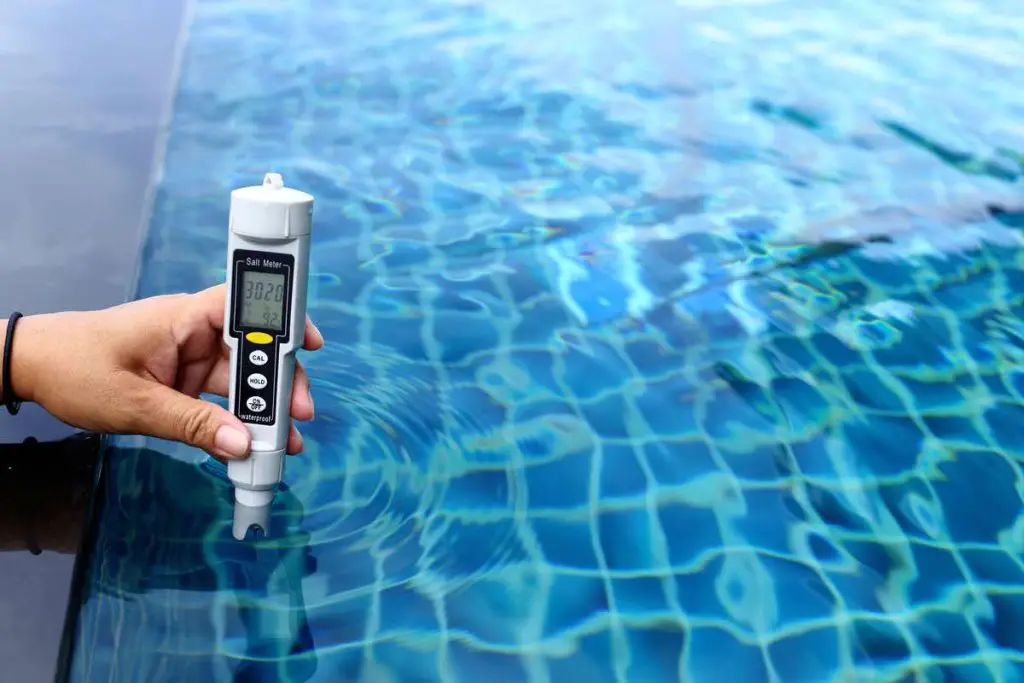Pools can provide a nice break from the heat and give all the members of a household an effective and fun way to stay in shape. However, pools can also be expensive to maintain and repair. The best way to avoid unnecessary expenses is to inspect it regularly, and you’ll be happy to know that a pool inspection shouldn’t take too long.
A pool inspection typically takes less than an hour. However, it could take up to two hours, depending on the size of the pool, the quantity and variety of water features and equipment, and the procedure the pool inspector uses. A team of inspectors will usually take half a single inspector would.
In this article, I will give you a comprehensive overview of how pool inspections work. I’ll outline its benefits, cost, and what pool inspectors do.

Determining How Long a Pool Inspection Will Take
Usually, a pool inspection takes no more than an hour. However, sometimes a pool inspection may take up to 2 hours due to the following factors:
Size and Style of the Swimming Pool
A large swimming pool may take longer to inspect compared to a smaller backyard pool. Inspectors must undertake pressure testing along the subsurface plumbing systems to look for leaks, and larger pools have more plumbing to work with.
Different swimming pool styles require varying features and equipment, which may impact the inspection time. The more sophisticated the equipment, the longer the inspection.
In addition, the shape of the pool may also impact the inspection time. A regular rectangular pool may take less inspection time compared to figure 8 pools, kidney pools, and other circular pools. Such shapes often have sophisticated connections that require a keen eye when inspecting.
Time of the Year
The time of year can significantly impact the inspection’s thoroughness. Cold temperatures often interfere with equipment testing. In certain instances, snow and ice make it impossible for inspectors even to remove the winter cover.
Although pool inspections are possible all winter long, visual checks work best when the pool is closed. Because of this, mid-spring to late fall is the optimal period for pool inspections.
I’ve written a comprehensive guide about pool inspects in the winter, where I discuss the most important items an inspector considers in cold seasons. [Can You Get a Pool Inspection in the Winter?]
Procedure of Inspection
Inspecting a regular yard pool should take less than an hour. However, this ultimately relies on the size of the pool and the pool inspector’s inspection method.
When a firm inspects a pool, it will generally take less time than if it were just one inspector. A regular yard pool may take one inspector about 60 minutes to inspect. On a similar scale, a team of inspectors might require only 30 minutes.
What Pool Inspectors Examine
A thorough pool inspection entails several essential items, including:
Pool Safety
The goal of pool inspectors is to ensure your pool safety is up to code. The pool inspectors will examine various safety factors, such as whether electrical cables are sufficiently far from the pool and whether there are any trip or slip risks on the walks around the pool.
Additionally, they’ll verify that your pool complies with all local rules regarding fencing, preventing accidents, or the entry of unauthorized personnel.
Pool Interior
Your swimming pool’s interior finish often assists in establishing its overall look. During the assessment, pool inspectors must check whether your pool interior is code-compliant to prevent serious problems such as cracking and collapse.
Vinyl liners occasionally get used for swimming pools. They aid in keeping the water inside the swimming pool and prevent seepage. However, it can be expensive to fix a tear in the lining.
Various plaster types may also serve to finish the pool in place of a vinyl liner. Although cracking of the interior plasters is common, pool inspectors inspect the interior materials to look for cracks that can cause severe issues in the future.
Pool Lighting
The inspector will check the pool’s lights, if any, to ensure they are operational. These lights could be brand-new LEDs or outdated light bulbs.
It will be crucial to inspect the lighting fixtures for condensation as well. Further inspection and maybe repair might be required if there is dampness or the lights are not functioning. If left unattended, this could develop into a mold and mildew problem.
Tile and Decking Around the Pool
The pool inspector will also examine the tile and decking condition around the pool.
They will check that the decking is good enough to allow water to drain when it splashes out of the pool. Additionally, ample drains should direct the water away from the house successfully.
The tiles serve both for looks and as a means of helping weatherproof the space. The inspector will also ensure that the tile is undamaged, the grout covers the appropriate locations, and everything looks in good shape.
Other features checked during the pool inspection include:
- Saltwater corrosion and the efficiency of the pool pumps and filter.
- The pool heater functionality.
- The yard beyond the pool.
If you don’t have tiles on your deck, you should read my guide on the topic. I’ll explain how you can install tiles on your existing deck and discuss the benefits of doing so. [Can You Tile Over an Existing Pool Deck?]
Benefits of a Pool Inspection
If not well kept, swimming pools might be more stressful than enjoyable. Consider getting your swimming pool inspected if you own a property with a pool or are looking to buy a house with one. An inspection could help you avoid costly repairs, regulations, and other issues.
These are the key benefits of a pool inspection:
- Keeping Track of Your Pool Chemicals: Your swimming pool is safe to swim and spend time with family if you ensure regular chemical monitoring and adjustments.
- Ensures Pool Equipment is Working Properly: Equipment inspections allow you and your family to swim safely without injuries such as cuts and bruises or the risk of drowning.
- Aids in Price Negotiations: When negotiating the price of your new home, having a pool inspection in hand can be helpful. Before you even deal with the overall offer, you’ll want to discuss any essential repairs or improvements.

Conclusion
A regular pool inspection ensures you enjoy the glitz and glamor of pool ownership without the hassle of frequent breakdowns. Rather than seeing a pool inspection as an annoying duty, view it as an integral element of maintaining a safe amenity for your family.
Additionally, keep in mind that a pool increases the value of your house—but only if it’s in excellent condition.
The better maintenance you provide your pool, the less likely you will need major, expensive repairs. Maintaining tiny issues enables you to glide through life stress-free, at least as it pertains to your pool.
Sources
- Angi: Should You Get a Pool Inspection? A Guide for Homeowners
- Pool Buyer Guide: Swimming Pool Inspections: What Inspectors Check for and the Cost
- Pool Care Specialists: 4 Reasons to Get a Swimming Pool Inspection Before You Buy a Home with a Pool
- WIN Home Inspection: Pool Inspection: What Home Inspectors Check For and How Much Does it Cost
